Maintaining a Stoic Personality in Relationships? In today’s fast-paced world, Stoicism’s teachings are more relevant than ever, especially in personal relationships.
Whether romantic, familial, or platonic, relationships can be complex and emotionally charged. Explore the benefits and challenges and learn practical tips for cultivating stoic traits and fostering healthy connections.
Stoicism Approach to Relationships
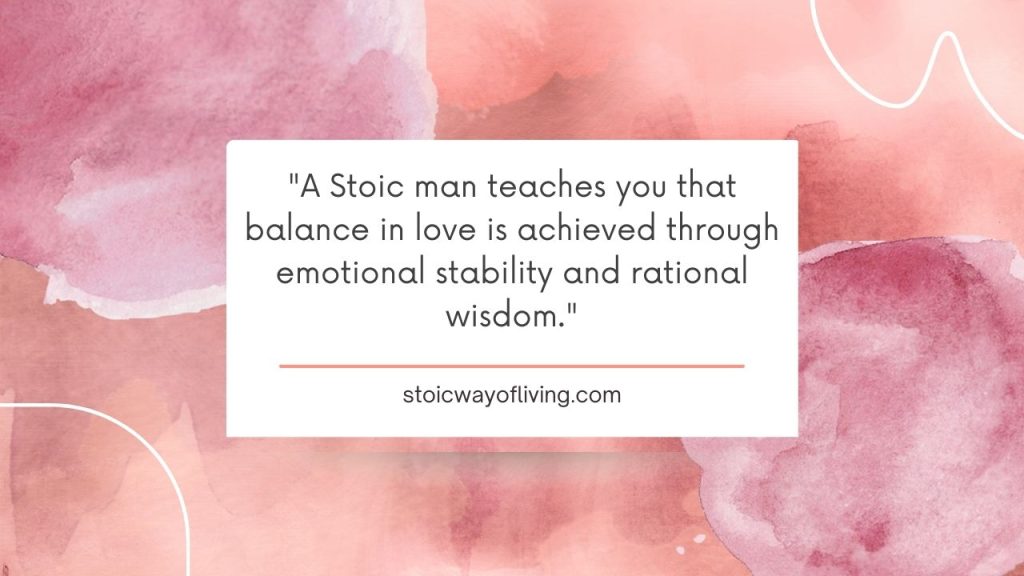
“Choose not to be harmed—and you won’t feel harmed. Don’t feel harmed—and you haven’t been.” These words from Marcus Aurelius encapsulate the essence of Stoicism.
Stoicism, an ancient Greek philosophy founded by Zeno of Citium, centers on four cardinal virtues: wisdom, courage, justice, and temperance.
These principles guide individuals to lead virtuous lives by focusing on what they can control and accepting what they cannot.
In relationships, these virtues translate into practical behaviors that promote stability and understanding.
Wisdom helps us navigate complex emotional landscapes, courage enables us to face challenges honestly, justice ensures fairness and respect, and temperance encourages moderation and self-control.
Maintaining a Stoic Personality in Relationships
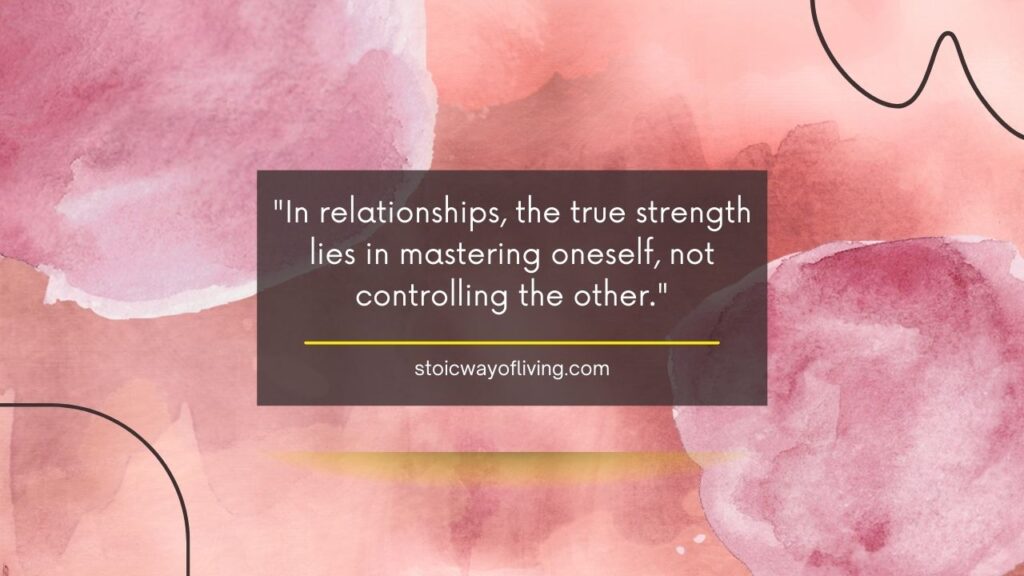
The Importance of Self-Control
In Stoicism, self-control is paramount. It involves regulating one’s emotions and reactions to external events.
This means managing our responses to our partner’s actions and words in relationships. Instead of reacting impulsively or emotionally, Stoicism teaches us to pause, reflect, and respond thoughtfully.
This practice prevents unnecessary conflicts and misunderstandings. For instance, if a partner forgets an important date, a Stoic would consider the broader context and respond calmly instead of reacting with anger or disappointment.
Techniques such as mindfulness meditation, journaling, and cognitive reframing can help cultivate this self-control, leading to more harmonious interactions.
Practicing Empathy and Understanding
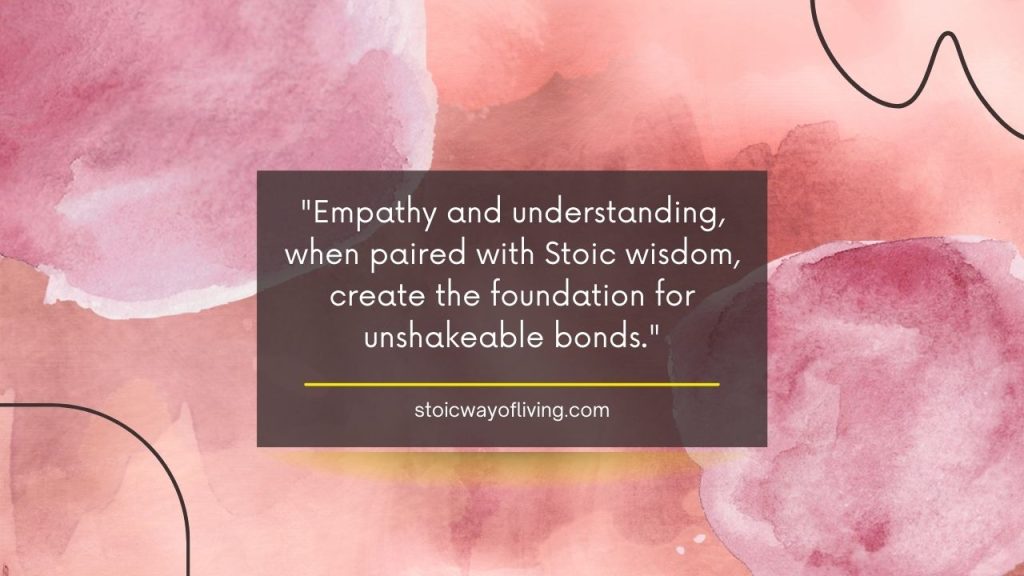
While Stoicism emphasizes emotional regulation, it also values empathy and understanding. Empathy in Stoicism means understanding others’ perspectives without being overwhelmed by their emotions.
This balance allows us to connect deeply with others while maintaining our emotional stability. In relationships, practicing empathy can lead to more meaningful and supportive connections.
For example, if a partner is upset about a work issue, a Stoic response would involve listening attentively, acknowledging their feelings, and offering support without becoming emotionally entangled.
The Art of Communication

Effective communication is the cornerstone of any healthy relationship. Stoicism advocates for transparent, honest, and rational communication.
This involves expressing oneself honestly while also listening actively and empathetically.
Stoic communication avoids emotional manipulation, exaggeration, and passive-aggressive behavior.
Techniques such as active listening, where one entirely concentrates on the speaker without interrupting, and reflective responses, which show understanding and validation, can significantly improve communication.
Balancing Independence and Togetherness
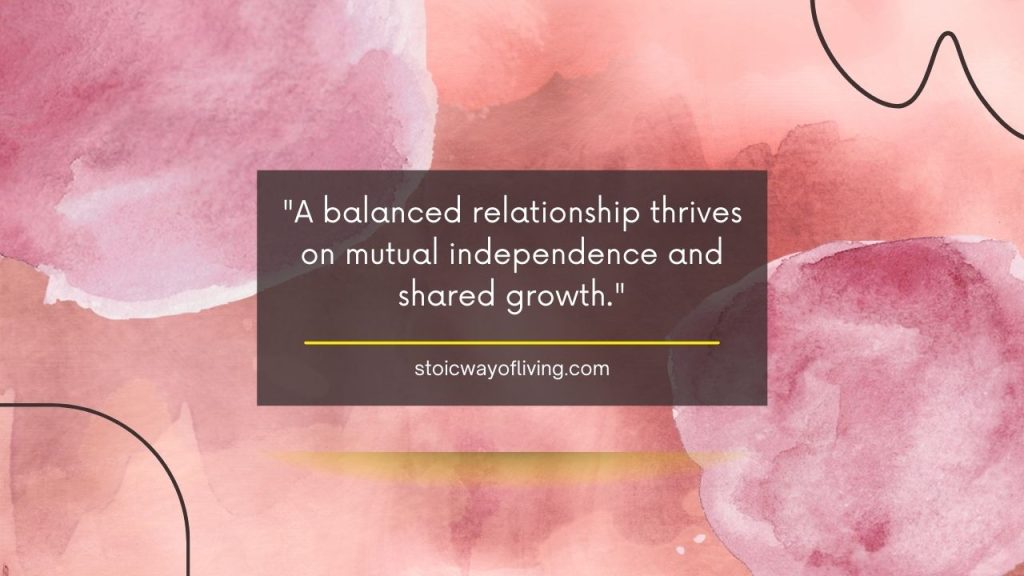
Stoicism teaches the value of personal autonomy and self-reliance.
In relationships, this means maintaining one’s identity and independence while supporting and relying on one’s partner.
A healthy relationship involves a balance between independence and togetherness.
Partners should support each other’s personal growth and aspirations while working together towards common goals. This balance ensures that both individuals can thrive independently and as a couple.
Stoic practices such as self-reflection and goal-setting can help maintain this balance, fostering a relationship where both partners feel valued and fulfilled.
Managing Expectations

One of the core tenets of Stoicism is focusing on what we can control and accepting what we cannot.
In relationships, this translates to having realistic expectations and understanding that our partner is human and will have flaws and make mistakes.
Instead of trying to change our partners or being disappointed when they don’t meet our expectations, Stoicism encourages us to accept them and focus on our reactions and behaviors.
This acceptance leads to a more harmonious relationship, as it reduces unnecessary stress and conflict.
Strategies such as open communication about expectations and regular self-reflection can help manage and align expectations in a relationship.
Handling Conflict
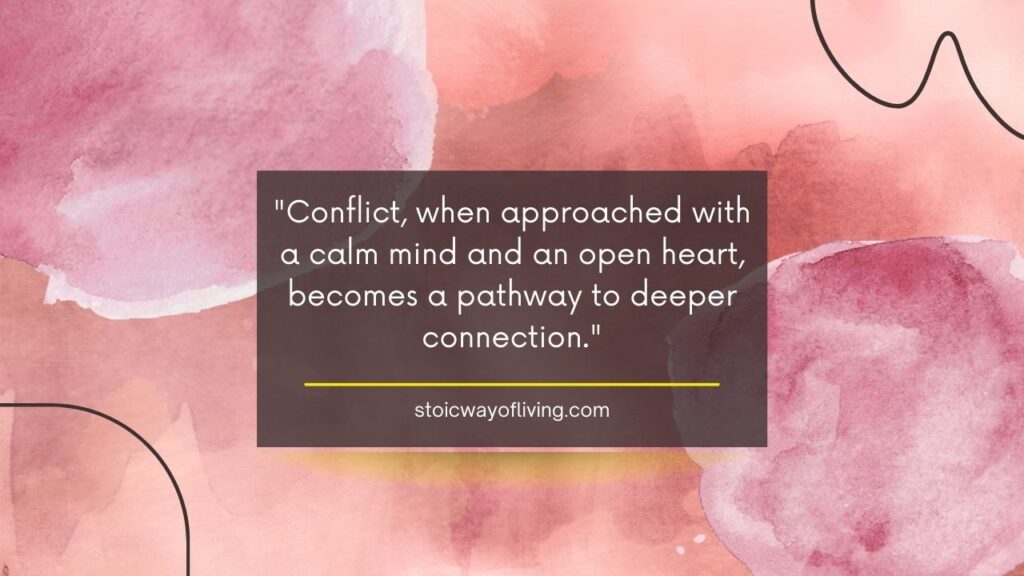
Conflicts are inevitable in any relationship, but how we handle them can make all the difference. Stoicism provides valuable tools for managing conflicts calmly and rationally.
Instead of reacting with anger or frustration, a Stoic approach involves pausing, considering the situation from a broader perspective, and responding with reason and empathy. This method not only helps in resolving the conflict but also strengthens the relationship.
Practical steps for handling conflict the Stoic way include taking deep breaths to calm down, actively listening to the other person’s perspective, and finding common ground for a solution.
Cultivating Gratitude and Appreciation

Gratitude is a fundamental aspect of Stoicism. Practicing gratitude helps us focus on the positive aspects of our relationships and appreciate our partners for who they are.
Showing appreciation can strengthen the bond and foster a more profound relationship connection.
Simple daily practices such as expressing thanks for small acts of kindness, acknowledging your partner’s efforts, and reflecting on the positive moments in your relationship can cultivate a sense of gratitude.
This practice enhances the relationship and contributes to our overall well-being and happiness.
Conclusion
Maintaining a stoic personality in relationships is crucial for emotional resilience and understanding.
Stoicism offers timeless wisdom that can significantly enhance our relationships. We can build stronger, more resilient connections by embracing self-control, empathy, effective communication, and gratitude.
The Stoic approach encourages us to focus on what we can control, accept what we cannot, and cultivate virtues that lead to a fulfilling and balanced life.
Applying these principles in our relationships can lead to greater harmony, understanding, and mutual respect.


